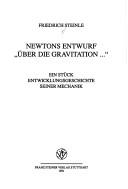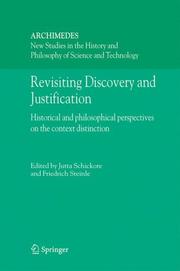| Listing 1 - 10 of 20 | << page >> |
Sort by
|

ISBN: 3515057153 Year: 1991 Volume: vol 26 Publisher: Stuttgart Steiner
Abstract | Keywords | Export | Availability | Bookmark
 Loading...
Loading...Choose an application
- Reference Manager
- EndNote
- RefWorks (Direct export to RefWorks)
Algemene zwaartekracht --- Gravitatie --- Gravitation --- Hydrostatics --- -Mechanics, Analytic --- -Analytical mechanics --- Kinetics --- Fluid mechanics --- Statics --- Fluids --- Field theory (Physics) --- Matter --- Physics --- Antigravity --- Centrifugal force --- Relativity (Physics) --- History --- -History --- -Properties --- Newton, Isaac Sir --- -Newton, Isaac Sir --- -Contributions in analytic mechanics --- Contributions in hydrostatics --- Mechanics, Analytic --- Analytical mechanics --- Newton, Isaac, --- Properties
Book
ISBN: 3515081852 Year: 2005 Publisher: Stuttgart Franz Steiner Verlag
Abstract | Keywords | Export | Availability | Bookmark
 Loading...
Loading...Choose an application
- Reference Manager
- EndNote
- RefWorks (Direct export to RefWorks)
Book
ISBN: 9783110335736 3110335735 Year: 2015 Publisher: Boston De Gruyter
Abstract | Keywords | Export | Availability | Bookmark
 Loading...
Loading...Choose an application
- Reference Manager
- EndNote
- RefWorks (Direct export to RefWorks)
Knowledge of the properties, mixtures, harmonies, meanings and uses of colour has always been widely distributed among painters and architects, dyers and printers, pigment producers and merchants, physicists and chemists. This volume focuses on how different communities interacted with respect to their colour knowledge and practices and hereby provides a step towards a better understanding of a central cultural development.
Dyes --- Art --- color theory --- anno 1600-1699 --- anno 1700-1799 --- Color --- Symbolism of colors. --- Color in art. --- Color vision. --- Couleur --- Symbolisme des couleurs --- Couleur dans l'art --- Vision des couleurs --- History --- Histoire --- 7.01 --- 535.6 --- Kleuren ; de wetenschap, kennis en praktijk ; 17de en 18de eeuw --- Chromatic vision --- Color discrimination --- Color perception --- Color-sense --- Visual perception --- Colors in art --- Monochrome art --- Color symbolism --- Symbolic colors --- Colors --- Chromatics --- Colour --- Chemistry --- Light --- Optics --- Thermochromism --- Kunst ; theorie, filosofie, esthetica --- Natuurkunde ; kleurenleer --- Psychological aspects --- Symbolism of colors --- Color in art --- Color vision
Book
ISBN: 1280611030 9786610611034 1402042515 Year: 2006 Volume: 14 Publisher: Dordrecht : Springer,
Abstract | Keywords | Export | Availability | Bookmark
 Loading...
Loading...Choose an application
- Reference Manager
- EndNote
- RefWorks (Direct export to RefWorks)
The distinction between the contexts of discovery and justification has had a turbulent career in philosophy of science. At times celebrated as the hallmark of philosophical approaches to science, at times condemned as ambiguous, distorting, and misleading, the distinction dominated philosophical debates from the early decades of the twentieth century to the 1980s. Until today, it informs our conception of the content, domain, and goals of philosophy of science. It is due to this fact that new trends in philosophy of experimentation and history and sociology of science have been marginalized by traditional scholarship in philosophy. To acknowledge properly this important recent work we need to re-open the debate about the nature, development, and significance of the context distinction, about its merits and flaws. The contributions to this volume provide close readings and detailed analyses of the original textual sources for the context distinction. They revise those accounts of ‘forerunners’ of the distinction that have been written through the lens of Logical Empiricism. They map, clarify, and analyse the derivations and mutations of the context distinctions as we encounter them in current history and philosophy of science. The re-evaluation of the distinction helps us deal with the philosophical challenges that the New Experimentalism and historically, socio-politically and economically oriented science studies have placed before us. This volume thus clears the ground for the productive and fruitful integration of these new developments into philosophy of science.
Science --- Justification (Theory of knowledge) --- Philosophy. --- Knowledge, Theory of --- Normal science --- Philosophy of science --- History. --- Genetic epistemology. --- Philosophy (General). --- Philosophy of Science. --- History of Science. --- Epistemology. --- History of Philosophy. --- Annals --- Auxiliary sciences of history --- Developmental psychology --- Philosophy and science. --- Mental philosophy --- Humanities --- Epistemology --- Theory of knowledge --- Philosophy --- Psychology --- Science and philosophy

ISBN: 1402042507 9781402042508 9048170869 9786610611034 1280611030 1402042515 Year: 2006 Publisher: Dordrecht Springer
Abstract | Keywords | Export | Availability | Bookmark
 Loading...
Loading...Choose an application
- Reference Manager
- EndNote
- RefWorks (Direct export to RefWorks)
Discoveries in science. --- Science --- Philosophy. --- Philosophy --- Discoveries in science --- Normal science --- Philosophy of science --- Breakthroughs, Scientific --- Discoveries, Scientific --- Scientific breakthroughs --- Scientific discoveries --- Creative ability in science --- Research
Book
ISBN: 1283856522 3110253615 9783110253610 9781283856522 9783110253603 3110253607 Year: 2012 Publisher: Berlin de Gruyter
Abstract | Keywords | Export | Availability | Bookmark
 Loading...
Loading...Choose an application
- Reference Manager
- EndNote
- RefWorks (Direct export to RefWorks)
Recent philosophy and history of science has seen a surge of interest in the role of concepts in scientific research. Scholars working in this new field focus on scientific concepts, rather than theories, as units of analysis and on the ways in which concepts are formed and used rather than on what they represent. They analyze what has traditionally been called the context of discovery, rather than (or in addition to) the context of justification. And they examine the dynamics of research rather than the status of the finished research results. This volume provides detailed case studies and general analyses to address questions raised by these points, such as:- Can concepts be clearly distinguished from the sets of beliefs we have about their referents?- What - if any - sense can be made of the separation between concepts and theories?- Can we distinguish between empirical and theoretical concepts?- Are there interesting similarities and differences between the role of concepts in the empirical sciences and in mathematics?- What underlying notion of investigative practice could be drawn on to explicate the role of concept in such practice? - From a philosophical point of view, is the distinction between discovery and justification a helpful frame of reference for inquiring into the dynamics of research?- From a historiographical point of view, does a focus on concepts face the danger of falling back into an old-fashioned history of ideas?
Research --- Knowledge, Theory of. --- Epistemology --- Theory of knowledge --- Philosophy --- Psychology --- Methodology. --- Philosophy. --- Knowledge, Theory of --- Methodology --- History of Science. --- Philosophy of Science. --- Scientific Concepts. --- Scientific Research.
Book
ISBN: 0822981378 9780822981374 9780822944508 0822944502 Year: 2016 Publisher: Pittsburgh University of Pittsburgh Press
Abstract | Keywords | Export | Availability | Bookmark
 Loading...
Loading...Choose an application
- Reference Manager
- EndNote
- RefWorks (Direct export to RefWorks)
The nineteenth century was a formative period for electromagnetism and electrodynamics. Hans Christian Ørsted's groundbreaking discovery of the interaction between electricity and magnetism in 1820 inspired a wave of research, led to the science of electrodynamics, and resulted in the development of electromagnetic theory. Remarkably, in response, André-Marie Ampère and Michael Faraday developed two incompatible, competing theories. Although their approaches and conceptual frameworks were fundamentally different, together their work launched a technological revolution-laying the foundation for our modern scientific understanding of electricity-and one of the most important debates in physics, between electrodynamic action-at-a-distance and field theories. In this foundational study, Friedrich Steinle compares the influential work of Ampère and Faraday to reveal the prominent role of exploratory experimentation in the development of science. While this exploratory phase was responsible for decisive conceptual innovations, it has yet to be examined in such great detail. Focusing on Ampère's and Faraday's research practices, reconstructed from previously unknown archival materials, including laboratory notes, diaries, letters, and interactions with instrument makers, this book considers both the historic and epistemological basis of exploratory experimentation and its importance to scientific development.
Science --- Electromagnetism --- Electrodynamics --- Scientific method --- Logic, Symbolic and mathematical --- Electromagnetics --- Magnetic induction --- Magnetism --- Metamaterials --- Dynamics --- Methodology. --- History. --- Faraday, Michael, --- Ampere, Andre-Marie, --- Faraday, M. --- Faradeĭ, Mikhail, --- Faradeĭ, Maĭkŭl, --- Fa-la-ti, --- פאראדײ, מ. --- Faradeĭ, Maĭkl, --- Фарадей, Майкл, --- Électrodynamique --- Électromagnétisme --- Sciences --- Histoire. --- Méthodologie. --- Ampère, André-Marie,
Book
ISBN: 3789053678 Year: 1998 Publisher: Baden-Baden : Nomos Verlagsgesellschaft,
Abstract | Keywords | Export | Availability | Bookmark
 Loading...
Loading...Choose an application
- Reference Manager
- EndNote
- RefWorks (Direct export to RefWorks)
Science --- Science --- Experiments --- History. --- History.
Multi
ISBN: 9781402042515 Year: 2006 Publisher: Dordrecht Springer
Abstract | Keywords | Export | Availability | Bookmark
 Loading...
Loading...Choose an application
- Reference Manager
- EndNote
- RefWorks (Direct export to RefWorks)
Theory of knowledge --- Philosophy of science --- History of philosophy --- Pure sciences. Natural sciences (general) --- wetenschapsgeschiedenis --- filosofie --- geschiedenis --- epistomologie --- kennisleer
Book
ISBN: 9781402088926 1402088922 9781402088933 9048180198 9786611920418 128192041X 1402088930 Year: 2009 Publisher: New York Springer
Abstract | Keywords | Export | Availability | Bookmark
 Loading...
Loading...Choose an application
- Reference Manager
- EndNote
- RefWorks (Direct export to RefWorks)
Examines errors and failures in scientific experiments in order to shed light on science in general, the scientific method, and the way knowledge is pursued and generated.
Errors, Scientific --- Research --- Science --- Natural science --- Science of science --- Sciences --- Science research --- Scientific research --- Information services --- Learning and scholarship --- Methodology --- Research teams --- Mistakes, Scientific --- Scientific errors --- Errors --- History --- Experiments --- Philosophy --- Philosophy of science --- Natural sciences
| Listing 1 - 10 of 20 | << page >> |
Sort by
|

 Search
Search Feedback
Feedback About UniCat
About UniCat  Help
Help News
News